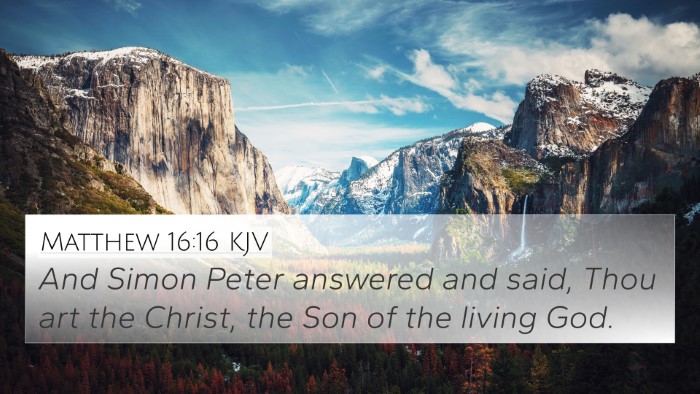Understanding John 6:68
In John 6:68, Simon Peter responds to Jesus' question of whether the disciples also want to leave Him, asserting, "Lord, to whom shall we go? You have the words of eternal life." This verse encapsulates a significant moment of commitment and affirmation of faith among the disciples.
Verse Context and Overview
This verse emerges from a discourse in which Jesus speaks about being the Bread of Life. Many of His followers found His teachings difficult and chose to abandon Him. Peter's response highlights the realization that despite the challenges, Jesus possesses divine truth and the promise of eternal life.
Significance of Peter's Confession
Peter's acknowledgment of Jesus' unique authority: This declaration showcases Peter's understanding that no one else offers what Christ provides—namely, the words that lead to eternal life. It reflects a deep dependency on Jesus for spiritual sustenance.
The concept of loyalty and commitment: Peter's response demonstrates loyalty amidst uncertainty. It is a testament to faith that recognizes Jesus as the sole source of hope.
Commentary Insights
-
Matthew Henry:
Henry emphasizes Peter's role as a spokesperson for the disciples, affirming their commitment to Jesus. He underscores that true discipleship means recognizing that only Christ holds the words of eternal life and every other source leads to emptiness.
-
Albert Barnes:
Barnes points out that Peter's question reflects an understanding of the alternative—acknowledging that apart from Jesus, there is no other source that offers salvation or life. This stark choice emphasizes the necessity of faith in Christ.
-
Adam Clarke:
Clarke elaborates on the notion of Jesus' teachings as vital and necessary as bread to life. He highlights that the words of Christ are food for the soul, essential for spiritual life and growth.
Bible Verse Cross-References
Several Bible verses resonate with the themes present in John 6:68, underscoring the interconnectedness of scripture:
- Matthew 16:16: Simon Peter replied, "You are the Messiah, the Son of the living God." This shows Peter's recognition of Jesus' divine nature.
- John 3:36: "Whoever believes in the Son has eternal life." This reinforces the connection between belief in Christ and eternal life.
- Acts 4:12: "Salvation is found in no one else, for there is no other name under heaven given to mankind by which we must be saved." This parallels Peter's acknowledgment of Jesus as the only source of salvation.
- Hebrews 4:12: "For the word of God is alive and active. Sharper than any double-edged sword, it penetrates even to dividing soul and spirit." This describes the life-giving nature of Jesus' words.
- John 14:6: "I am the way and the truth and the life." Jesus explicitly states His role as the source of truth and life, echoed in Peter's proclamation.
- Romans 10:17: "So faith comes from hearing, and hearing through the word of Christ." This illustrates the essential link between Jesus’ words and faith.
- 1 John 5:11-12: "And this is the testimony: that God gave us eternal life, and this life is in His Son." This emphasizes eternal life as found in Jesus alone.
Thematic Connections in John 6:68
This verse serves as a crossroads in theological discussions about faith, discipleship, and the nature of Jesus' teachings:
- Faith and Dependence: Peter's rhetorical question signifies a dependence on Jesus, which is a recurring theme throughout the Gospels.
- The Quest for Truth: The verse invites reflections on the nature of truth—where it is found and the willingness to seek it through Jesus' words.
- The Nature of Discipleship: It leads into discussions about the cost of following Christ and the commitment required in the journey of faith.
Cross-Referencing Biblical Texts
The importance of understanding scripture through inter-Biblical dialogue cannot be overemphasized. John 6:68 naturally connects with themes explored in both the Old and New Testaments. Cross-referencing can illuminate deeper meanings and provide insight into God's overall message:
- Deuteronomy 8:3: "Man does not live on bread alone but on every word that comes from the mouth of the Lord." This Old Testament verse echoes the spiritual sustenance found in Christ's teachings.
- Psalms 119:105: "Your word is a lamp for my feet, a light on my path," reinforcing the guiding power of Jesus’ words.
- Colossians 3:16: "Let the message of Christ dwell among you richly," showing the centrality of Jesus' message in the lives of believers.
How to Use Cross-References Effectively
For those studying scripture, utilizing cross-references can greatly enhance understanding:
- Identifying Connections: Look for links between historical texts and theological themes, drawing parallels that deepen understanding.
- Cross-Referencing Bible Study Methods: Use tools such as a Bible concordance or a cross-reference Bible study guide to explore thematic connections.
- Exploring Inter-Biblical Dialogues: Delve into how various scripture passages converse with each other about core theological points, providing a comprehensive view of biblical narratives.
Conclusion
In sum, John 6:68 encapsulates a profound moment of recognition and commitment from one of Jesus' closest followers. A deeper exploration of this verse reveals significant connections within scripture that emphasize the importance of faith, the uniqueness of Christ’s teachings, and the vital nature of eternal life found in Him alone.













